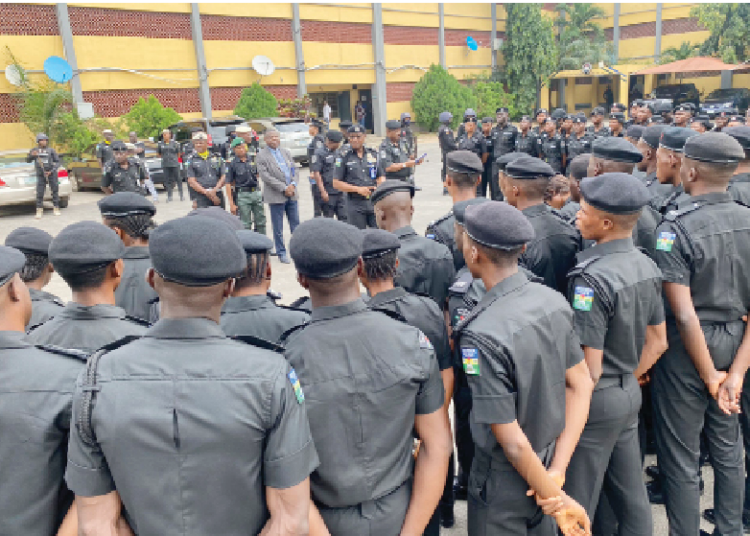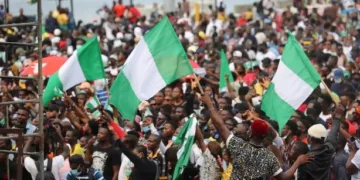The spate of insecurity in the country has recently dominated the public discourse. It remains curious that the bulk of the narrative has been tailored towards the Nigerian military. While this is understandable, given the invaluable role of the military in preserving the country’s territorial integrity, it must be noted that that institution is not primarily responsible for internal security operations or enforcing law and order.
As a newspaper, we recognise that the military involvement in internal security operations is inevitable given the current situation, as a higher level of aggression continually reveals itself. However, it should not take away the fact that the Nigerian Police Force (NPF) is constitutionally mandated to handle internal security operations in the country, and that the military involvement is to aid the police to avoid a complete breakdown of law and order. This has been a constant happenstance, and it now seems the military is responsible for maintaining law and order.
Section 217 of the 1999 Constitution of the Federal Republic of Nigeria, as amended, provides that the duties of the military, that is the Army, Navy and Air force will be to defend Nigeria from external aggression, maintain its territorial integrity and secure its borders from isolation on land, sea or air, suppressing insurrection and acting in aid of civil authorities to restore order when called upon to do so by the President but subject to such conditions as may be prescribed by an Act of National Assembly.
As explicit as the Constitution’s provisions are, the military does not have the authority to restore law and order. The president can summon the military to assist the Police, but this is subject to an act of the National Assembly.
The call to reform the police is as old as the Fourth Republic. Successive administrations have made attempts in this regard, but with little result. In 2006, former president Olusegun Obasanjo established the Dan Mandami-led Presidential Panel on Police Reforms. In 2008, former president Umaru Yar’Adua formed the Muhammadu Dikko Yusuf Presidential Panel on Police Reform. In 2012, the Goodluck Jonathan administration also created the Parry Osayande Panel.
The Presidential Panel on Special Anti-Robbery Squad (SARS) reform in Nigeria was established in 2018. It is noteworthy that despite these efforts, the Nigerian Police remain largely unchanged. We are concerned that the nation has yet to find the right approach to reforming the Nigerian Police despite numerous attempts.
As a newspaper, we align with the position that one of the issues militating against effective policing in the country is the quality of recruitment into the Police. It can also be argued that regardless of whatever laudable initiative is introduced to reform the police, as long as the recruitment process is fraught with anomalies, reforming the force would remain a mirage. Policing as a professional pursuit is noble, and it must be for noble people and not persons of questionable character. Our position is that the relevant authorities, as a first step, must review the recruitment policy of the Nigerian Police Force.
We can easily recall that in 2024, there were issues between the Nigerian Police Force and the Police Service Commission over recruiting 10,000 constables and specialists into the Nigerian Police Force.
According to the Force Public Relations Officer, ACP Olumuyiwa Adejobi, the “recruitment exercise was marred by irregularities and alleged corruption, including names of individuals who did not even apply, failed the initial screening stages or were deemed medically unfit.” These are indeed worrisome tales, if accurate, and they came from the spokesperson of the Nigerian Police Force, which lends credence to the position that the police recruitment policy remains one of the factors militating against effective policing in the country.
The Muhammadu Buhari administration introduced the New Vision for Policing in Nigeria template in 2022 to “create a more effective, accountable and responsive police institution; better able to fight crime and secure the life and property of citizens through operationalisation of the provisions of the Police Act 2020.” However, it is still a far cry from addressing the fundamental issue of the quality of recruitment.
The recently unveiled Revitalised Police Agenda and Transformation Roadmap by the Ministry of Police Affairs, in collaboration with the Nigerian Police Force, also did not touch on reviewing the recruitment policy of the Nigerian Police Force. The focus areas of the roadmap include enhancing infrastructure development, boosting technical and operational efficiency, improving welfare, establishing a robust policy framework for policing in Nigeria, strengthening community policing, building public trust, and rebranding the force to restore citizens’ confidence.
While this newspaper acknowledges the efforts by the police authorities in recent times, it barely scratches the surface. The recruitment policy must be given as much attention as possible to ensure that only those fit for purpose are recruited into the police. That is the foundation, and this is our stand.





